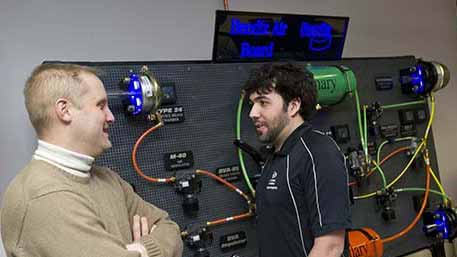Vibrations Advanced Certificate


Vibrations
Advanced Certificate
- RIT /
- Rochester Institute of Technology /
- Academics /
- Vibrations Adv. Cert.
Request Info about graduate study
Visit
Apply
Department of Mechanical Engineering
Vibration engineering helps you control vibration in engineering systems and in everything from consumer product development and design, manufacturing, aerospace and automotive systems, and more.
Overview for Vibrations Adv. Cert.
Engineers with skills in vibration engineering contribute to creating manufacturing production systems, aerospace systems, automotive engineering, medical product development, consumer product development, and a host of industrial equipment and process systems in which vibration must be minimized or controlled.
The Impact of Machine Vibrations
Vibrations generated by machines and equipment can be disruptive and disturbing. Engineers often seek to reduce vibration so they can increase the durability and reliability of a machine, machinery system, or product; eliminate stress on a structure; and/or reduce damage, abnormal stoppage, or catastrophic failure. Targeted vibration prevention is the goal of a vibrations engineer.
Vibration Courses
The advanced certificate in vibrations takes you beyond the preparation in vibration engineering that you would typically complete during your undergraduate program of study. In this collection of graduate level courses, you will learn to use sophisticated software tools, analytical techniques and experimental methods to design, develop, and implement solutions for problems of vibration control and minimization in engineering systems. You will also be exposed to modern technologies used in industry to ensure that you are prepared for today's highly specialized job market. The curriculum answers a need for graduate-level instruction for practicing engineers in a field of importance for the 21st century.
What is a Graduate Certificate?
A graduate certificate, also called an advanced certificate, is a selection of up to five graduate level courses in a particular area of study. It can serve as a stand-alone credential that provides expertise in a specific topic that enhances your professional knowledge base, or it can serve as the entry point to a master's degree. Some students complete an advanced certificate and apply those credit hours later toward a master's degree.
Students are also interested in: Mechanical Engineering MS, Mechanical Engineering ME
Join us for Fall 2024
Many programs accept applications on a rolling, space-available basis.
Curriculum for 2023-2024 for Vibrations Adv. Cert.
Current Students: See Curriculum Requirements
Vibrations, advanced certificate, typical course sequence
| Course | Sem. Cr. Hrs. | |
|---|---|---|
| First Year | ||
| MECE-658 | Introduction to Engineering Vibrations Is concerned with analytically finding the dynamic characteristics (natural frequencies and mode shapes) of vibratory mechanical systems (single-degree and multi-degrees of freedom systems), and the response of the systems to external excitations (transient, harmonic, and periodic). Application to vibration damping techniques (Dynamic Vibration Absorbers) is also covered. In addition, laboratory exercises are performed, and an independent design project is assigned. (Prerequisites: MECE-320 or equivalent course or graduate standing in the MECE-ME or MECE-MS program.) Lecture 3 (Fall). |
3 |
| MECE-707 | Engineering Analysis This course trains students to utilize mathematical techniques from an engineering perspective, and provides essential background for success in graduate level studies. An intensive review of linear and nonlinear ordinary differential equations and Laplace transforms is provided. Laplace transform methods are extended to boundary-value problems and applications to control theory are discussed. Problem solving efficiency is stressed, and to this end, the utility of various available techniques are contrasted. The frequency response of ordinary differential equations is discussed extensively. Applications of linear algebra are examined, including the use of eigenvalue analysis in the solution of linear systems and in multivariate optimization. An introduction to Fourier analysis is also provided. (Prerequisites: (MATH-241 and MATH-326) or graduate student standing in the MECE-MS or MECE-ME programs.) Lecture 3 (Fall, Spring). |
3 |
| MECE-709 | Advanced Engineering Mathematics Advanced Engineering Mathematics provides the foundations for complex functions, vector calculus and advanced linear algebra and its applications in analyzing and solving a variety of mechanical engineering problems especially in the areas of mechanics, continuum mechanics, fluid dynamics, heat transfer, and vibrations. Topics include: vector algebra, vector calculus, functions of complex variables, ordinary differential equations and local stability, advanced matrix algebra, and partial differential equations. Mechanical engineering applications will be discussed throughout the course. (Prerequisites: MECE-707 or equivalent course or graduate student standing in MECE-MS or MECE-ME.) Lecture 3 (Fall, Spring). |
3 |
| MECE-758 | Intermediate Engineering Vibrations Is concerned with analytically finding the dynamic characteristics (natural frequencies and mode shapes) of continuous mechanical vibratory systems (strings, rods, and beams), and the response of the systems to external excitations (transient and harmonic). Solutions using the finite element method is also introduced. (Prerequisites: MECE-658 or equivalent course or graduate student standing in MECE-MS or MECE-ME.) Lecture 3 (Spring). |
3 |
| Choose one of the following: | 3 |
|
| EEEE-602 | Random Signals and Noise In this course the student is introduced to random variables and stochastic processes. Topics covered are probability theory, conditional probability and Bayes theorem, discrete and continuous random variables, distribution and density functions, moments and characteristic functions, functions of one and several random variables, Gaussian random variables and the central limit theorem, estimation theory , random processes, stationarity and ergodicity, auto correlation, cross-correlation and power spectrum density, response of linear prediction, Wiener filtering, elements of detection, matched filters. (Prerequisites: This course is restricted to graduate students in the EEEE-MS, EEEE-BS/MS program.) Lecture 3 (Fall, Spring). |
|
| EEEE-678 | Digital Signal Processing In this course, the student is introduced to the concept of multi rate signal processing, Poly phase Decomposition, Transform Analysis, Filter Design with emphasis on Linear Phase Response, and Discrete Fourier Transforms. Topics covered are: Z- Transforms, Sampling, Transform Analysis of Linear Time Invariant Systems, Filter Design Techniques, Discrete Fourier Transforms (DFT), Fast Algorithms for implementing the DFT including Radix 2, Radix 4 and Mixed Radix Algorithms, Quantization Effects in Discrete Systems and Fourier Analysis of Signals. (Prerequisites: EEEE-707 or equivalent course.) Lecture 3 (Fall, Summer). |
|
| MECE-606 | Systems Modeling This course is designed to introduce the student to advanced systems modeling techniques and response characterization. Mechanical, electrical, fluid, and mixed type systems will be considered. Energy-based modeling methods such as Lagrange’s methods will be used extensively for developing systems models. System performance will be assessed through numerical solution using MATLAB/Simulink. Computer projects using Matlab/Simulink will be assigned and graded in this course including concepts of data analysis and how it performs to parameter estimation. Linearization of nonlinear system models and verification methods are also discussed. (Prerequisites: MECE-320 or equivalent course or graduate standing in the MECE-ME or MECE-MS program.) Lecture 3 (Spring). |
|
| Total Semester Credit Hours | 15 |
|
Admissions and Financial Aid
This program is available on-campus only.
| Offered | Admit Term(s) | Application Deadline | STEM Designated |
|---|---|---|---|
| Part‑time | Fall or Spring | Rolling | No |
Part-time study is 1‑8 semester credit hours. RIT will not issue a student visa for advanced certificates.
Application Details
To be considered for admission to the Vibrations Adv. Cert. program, candidates must fulfill the following requirements:
- Complete an online graduate application.
- Submit copies of official transcript(s) (in English) of all previously completed undergraduate and graduate course work, including any transfer credit earned.
- Hold a baccalaureate degree (or US equivalent) from an accredited university or college.
- A recommended minimum cumulative GPA of 3.0 (or equivalent).
- Submit a current resume or curriculum vitae.
- Submit a personal statement of educational objectives.
- Letters of recommendation are optional.
- Entrance exam requirements: None
- Writing samples are optional.
- Submit English language test scores (TOEFL, IELTS, PTE Academic), if required. Details are below.
English Language Test Scores
International applicants whose native language is not English must submit one of the following official English language test scores. Some international applicants may be considered for an English test requirement waiver.
| TOEFL | IELTS | PTE Academic |
|---|---|---|
| 79 | 6.5 | 56 |
International students below the minimum requirement may be considered for conditional admission. Each program requires balanced sub-scores when determining an applicant’s need for additional English language courses.
How to Apply Start or Manage Your Application
Cost and Financial Aid
An RIT graduate degree is an investment with lifelong returns. Graduate tuition varies by degree, the number of credits taken per semester, and delivery method. View the general cost of attendance or estimate the cost of your graduate degree.
A combination of sources can help fund your graduate degree. Learn how to fund your degree












